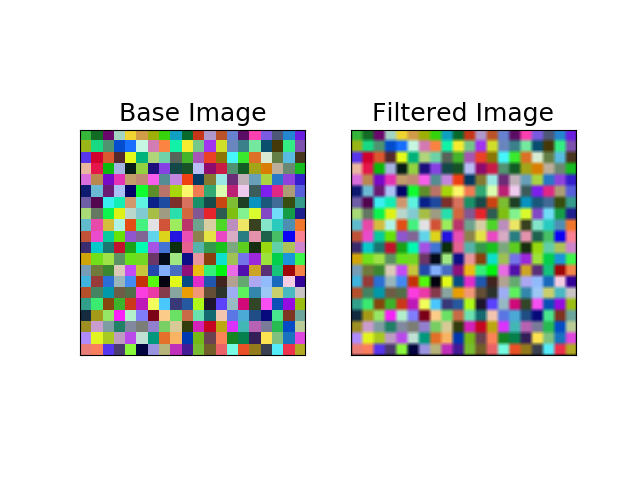Example: Averaging Filter
Objective
We will blur a given image using an Averaging filter.
The filter size is 19 19, and its coefficients are uniformly
.
Program
from PIL import Image
import nlcpy as vp
from matplotlib import pyplot as plt
def create_image(nx ,ny, nb):
rng = vp.random.default_rng(seed=0)
im = vp.empty((ny, nx, 3), dtype='u4')
dx = nx // nb
dy = ny // nb
for w in range(0, nx, dx):
for h in range(0, ny, dy):
pixel = rng.integers(0, 255, 3)
im[h:h+dy, w:w+dx] = pixel
return im
def zero_padding(im, kw, kh):
ex = kw // 2
ey = kh // 2
sx = im.shape[1] + ex * 2
sy = im.shape[0] + ey * 2
im_new = vp.zeros((sy, sx, im.shape[2]), dtype=im.dtype)
im_new[ey:-ey, ex:-ex] = im
return im_new
def save_image(im_in, im_out, path=''):
fig = plt.figure()
ax1 = fig.add_subplot(121)
ax2 = fig.add_subplot(122)
ax1.set_title('Base Image', fontsize=18)
ax2.set_title('Filtered Image', fontsize=18)
ax1.set_xticks([])
ax1.set_yticks([])
ax2.set_xticks([])
ax2.set_yticks([])
# Here, im_in and im_out must be transferred from Vector Engine
# to Vector Host by get()
# because ndarray of NLCPy does not support dtype='u1'.
# Please note that both im_in.get() and im_out.get() return a
# NumPy ndarrays.
im_in_np = im_in.get().astype('u1')
im_out_np = im_out.get().astype('u1')
im_in = Image.fromarray(im_in_np)
im_out = Image.fromarray(im_out_np)
ax1.imshow(im_in)
ax2.imshow(im_out)
plt.savefig(path)
def create_kernel(kw, kh):
kernel = vp.empty((kh, kw), dtype='f8')
kernel.fill(1. / kernel.size)
return kernel
def convolve(im, kernel):
ex = kernel.shape[1] // 2
ey = kernel.shape[0] // 2
im_filtered = vp.zeros_like(im)[ey:-ey, ex:-ex]
im_filtered = im_filtered.astype(dtype='f8', copy=True)
ix = im.shape[1] - kernel.shape[1] + 1
iy = im.shape[0] - kernel.shape[0] + 1
for w in range(kernel.shape[1]):
for h in range(kernel.shape[0]):
im_filtered[...] += im[h:iy+h, w:ix+w] * kernel[h, w]
return im_filtered
def averaging_filter(
nx, # The number of pixels in x-direction for creating image.
ny, # The number of pixels in y-direction for creating image.
nb, # The number of blocks in each axis for creating image.
kw, # The kernel width.
kh, # The kernel height.
):
print("creating image...", end="", flush=True)
im_in = create_image(nx ,ny, nb)
print("done", flush=True)
print("smoothing image...", end="", flush=True)
im_padded = zero_padding(im_in, kw, kh)
kernel = create_kernel(kw, kh)
im_out = convolve(im_padded, kernel)
print("done", flush=True)
print("saving image...", end="", flush=True)
save_image(im_in, im_out, './averaging_filter.png')
print("done", flush=True)
if __name__ == "__main__":
averaging_filter(1000, 1000, 20, 19, 19)
Result
